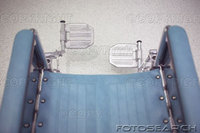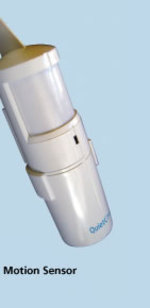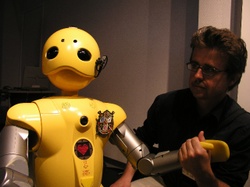![]()
As you may know I recently took on a new role. I am now editing a blog called A-Tech Review, which carries the name of my co-author Martin K. Bayne on it.
I have known Martin for 10 years but never met him. He’s one of the Internet friends I made through this newsletter. When I first knew him, Martin was also known as "Mr. Long Term Care," an expert on the problems of insurance and home health care. He was looking for e-commerce insight, which at the time was the main beat around here.
Martin had gotten his own beat the hard way, a diagnosis of adult-onset Parkinson’s that required he have visits from a health care worker in order to survive. Over time his disease process has continued, and he now lives in a nursing home. Eventually the disease will reach his heart, and the world will have lost a good man too soon.
Yet he has continued to work. (Picture by Corbis, available from Fotosearch.) Martin has recently perfected the lost art of the very short story, something that was quite common a century ago in the work of O.Henry and George Ade, who first published their work in newspapers. He has the idea of turning his stories into something like greeting cards — ask me about them.
But while he rages, he still can’t stop the dieing of the light. He has asked me to carry on his work, in the way I know best.
And so I shall.
This is no favor, no charity, however. This is a serious subject, one
that combines the technology beat I know well with a social problem as
enormous as global warming, namely aging.
Martin goes too soon, but we all go. And along the way we suffer. Eyes,
ears, legs, bodies. Some of us lose some part of ourselves at the
start, others early on the journey, still others in middle-age, but we
all lose all eventually. Along the way we want to remain as productive
as we can, as alive and as independent as we can.
This is no longer a luxury. Demographics have made it a necessity. Most
nations of the world are now reproducing at a less-than replacement
rate. They’re getting older. This means there are fewer young people to
care for the aging. We need help, the kind of help that technology can
provide us.
I have written here often about one form of that help, which I call the World of Always-On.
You use wireless networking as the application platform, linking
sensors and actuators to PCs and then on to the wider Internet. You can
monitor your health, you can keep your house running, you can track
your stuff.
One application set I imagined three years ago has come to market.
This is the idea of using motion sensors to track someone’s movement
around their house and alert caregivers only when something unusual is
going on. Current versions use large sensors and cost almost
$100/month, and while I consider that high (Moore’s Law should drop
it), it’s still an enormous savings. Elderly patients with dementia symptoms can now live at home longer, and may require less care along
the way. Given that a single home visit can cost $200, and it’s not
really that pleasant for the patient, this is cheap insurance.
But this is a drop in the bucket compared to what is coming, and what is necessary. From Dean Kamen’s space age wheelchair, to standardization of technologies for such things as screen readers, to automatic dosing of medicines, we are starting to see real action and real markets develop.
Yet economic necessity is moving even faster than technology. This is
why Japan has become a leader in robotics — not just to make Hondas,
but to keep mama-san on her own
a while longer. The areas of assistive technology, adaptive technology
and accessibility technology are about to boom like no other fields,
and thanks to Martin I’m going to be at the center of it.
What I hope to do is to combine all my previous journalism experience
in order to give this the kind of coverage it deserves. I’ve covered
the channel, I’ve covered the technology, I’ve covered e-commerce, and
I’ve covered the process of government policy-making. All this
knowledge will prove vital to my current endeavor, and if I can bring
in some money to fund it, and some expertise along the way, it will be
even better.
After all, I’m getting older, too.












